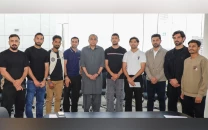‘Admitting you are a secularist can get you killed in Pakistan’
Academics lament that rulers have been using religion to their advantage for centuries.

PHOTO: FILE
Civil society representatives highlighted these points as they participated in a seminar titled ‘Democracy and secularism in Pakistan: Its need and importance’, at the Arts Council on Saturday. The event was organised by the Forum for Secular Pakistan. The participants urged political leaders to push for a secular state, “as there can be no democracy in the country without secularism”.
Prof. Dr Jaffar Ahmed, the chairperson of the Pakistan Study Centre, criticised Urdu linguists for “distorting” the meaning of ‘secular’ in earlier dictionaries. The word was originally used to refer to the small pieces of land that common people used to hold in the days when the Catholic Church would own most of the land. The word came to symbolise scientific inventions and progressive thought in the 19th century, he said.

Senator Hasil Bizenjo said that secularism had become, perhaps, the most difficult subject to talk about in the country. “If someone says that he is secular, people would kill him on the spot.” He said that only three to four political parties in the country had mentioned the word in their manifestos.
On the other hand, monarchs, as well as democratic governments, have been using religion to strengthen their rule for centuries. However, there have been a few prominent rulers, including the founder of the Mughal dynasty, who had grown worried over the amalgamation of religion with state affairs, said I A Rehman, the secretary general of the Human Rights Commission of Pakistan. “For democracy to survive, it is necessary for the state to stay neutral when it came to religion.”
Published in The Express Tribune, January 28th, 2013.





1733130350-0/Untitled-design-(76)1733130350-0-208x130.webp)













COMMENTS
Comments are moderated and generally will be posted if they are on-topic and not abusive.
For more information, please see our Comments FAQ